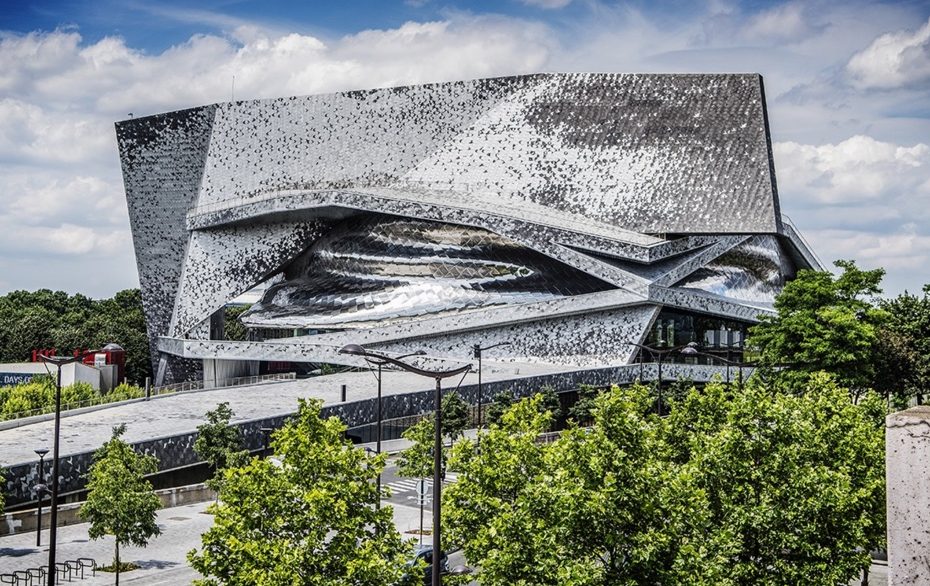
By Keith Powers
Ten years is a long time. Sixty-four years, much longer.
It’s been a decade since Anne Azéma became artistic director of the Boston Camerata — and more than six decades since the ensemble began performing. Both are a measure of the group’s profound impact on early music — and part of the reason why the Camerata will participate in a significant series of events in Paris — Boston Weekend, hosted by the Philharmonie de Paris — on Sept. 15 and 16.
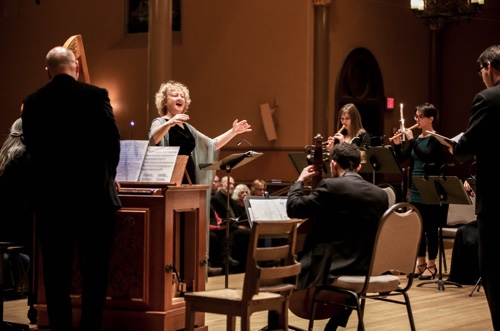
The weekend features two performances each by the Camerata and the Boston Symphony Orchestra, led by music director Andris Nelsons, and includes lecture presentations and collaborative rehearsals.
“The Camerata’s love affair with Paris began more than a generation ago,” Azéma says, “but among our many concert appearance in that town, this current invitation is the most exciting of all.”
Born in France and a longtime resident of the United States, Azéma created two programs for the weekend: “City on the Hill: Early Hymns and Spirituals of New England” and “Liberty Tree: Early Music for the American Soul.”
Emmanuel Hondré, director of programs for the Philharmonie, helped devise the presentations. “Since it opened, the Philharmonie de Paris has organized thematic weekends like mini-festivals,” Hondré says. “It was in that spirit that we conceived two programs in which utopian ideas, and the group conscience, would be brought to life in music. I chose to create a portrait of Boston when the Boston Symphony Orchestra was able to be here and give two concerts. The invitation to Anne stands as counterpoint to that, something that delves into the European cultural sources of the city.”
The Philharmonie de Paris, designed by Jean Nouvel, is part of a vast performing arts facility — the Cité de la Musique, which opened in 1995 — that boasts concert halls, rehearsal studios, exhibition areas, and other public places. The largest of the spaces, inaugurated in January 2015, is the innovative Grande salle Pierre Boulez, which has 2,400 seats — the furthest only 32 meters from the stage. The complex has multiple performance halls; the Camerata will perform in Le Studio, a rehearsal studio often used for public performances.
The Boston Camerata has deep roots in France, where Azéma also leads Aziman Ensemble, and in the rest of the world. The Camerata’s regular Boston-area subscription season has always been augmented by tours: frequently to Europe; in 2016 to Brazil; and almost annual tours of North America. The ensemble played in Paris at the Palais de Chaillot, with the Finnish dance company Tero Saarinen, in 2014 during the Camerata’s 60th anniversary season and at the Théâtre de la Ville the following year.
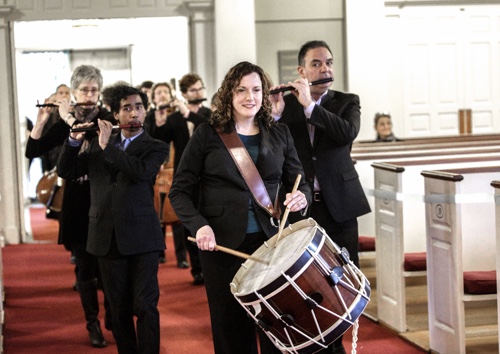
The “City on the Hill” program will be a new curation; “Liberty Tree” is an older Camerata program Azéma says “has to be revised by about one quarter.” Profoundly researched and well thought out — a given with this ensemble — both programs reflect the Camerata’s longtime concerns: musical scholarship and performance practice.
Not to mention current politics, which are rarely absent from a Camerata program. As an example, here’s part of the description for this fall’s opening Boston program Oct. 28 titled “The Tale of Fauvel: A Political Fable from Medieval France”:
“See and hear the orange creature gallop towards NowhereLand!”
Touché.
“Liberty Tree,” to be performed at Le Studio on Sept. 15, recalls the American Revolution. “With this commission, Emmanuel said, ‘Do your magic,’” Azéma says. “The music dates from about 1630 to about the Civil War. But it looks back in a different way than the original program. The original program dates back 20 years, and things have changed. Much of the music is different, but we have also changed our ideas about liberty and tyranny now.”
Settings by William Billings and Jeremiah Ingalls might ring a bell with some readers, but for the most part the music comes from “citizen-composers,” as Azéma calls them. The tunes, written for musical amateurs, are sometimes “maladroit, elementary, full of ‘faults,’” she says. “This music is about the soul of the American founding generation. It’s rough-hewn. This kind of program is inherently in our style.”
“City on the Hill” offers hymns and spirituals, many with musical origins brought to America by 17th-century Europeans. It has been designed as a participatory concert and includes audience preparation sessions that come “with the price of a ticket,” Azéma says. “We try to get them out of the concert hall experience. This has been important for me, in my tenth anniversary. This past year I’ve tried to see how we place ourselves on the stage, what it means to be in a concert situation. This program idea came directly from the Philharmonie.”

As Hondré says, “We wanted to work with a surrounding hall to bring to life the schema of the religious spaces of the period. This will allow intimate contact between the musicians and the audience.”
When it’s pointed out that the phrase “City on the Hill” may resonate as a Reagan-era slogan — it was co-opted by that administration for his vision of America — Azéma is quick to respond. “I’m definitely not a Reaganite. I took my cue from John Winthrop. It’s an idea that Winthrop and others had, that everyone would be looking at this new land, and that we would be like a city on the hill.
“They are all religious works,” she says, referring to the Shaker, Universalist, and Puritan hymns she has adapted for the program. “They are joined together by the idea of American exceptionalism. And also because the spirit of dissent is Calvinistic in a way that is intimately linked with Boston. Politics and music are one context. That’s the lovely part of being an early-music performer. Several pieces are really amateur recycling of pre-existing tunes, some originally used for liturgy. In ‘City on the Hill,’ we sing the ‘Yankee Doodle’ tune with new lyrics. That’s how it worked for political slogans — people knew the tune and heard it in a new context, a political context.”
The arrangement of the hall and the relationship between performer and listener are at the heart not only of this performance, but also a touchstone for Azéma as she reflects on her decade of directorship.
“We are in a different cultural context now,” she says, speaking of the audience-performer dynamic. “The public and the younger generation remind us that lots of music-making has been lazy. I spend most of my life performing music that was never destined for a concert hall. Most of this repertoire does not come from the premise that the performer and the audience are facing each other. That has to be re-examined. If you think about it in that context, it gives you wings. And the first question to address is moving the seating arrangement.”
The interest in what performing — or participating in music — was like is balanced by the impact of revisiting history. “The reason I’m interested in early music is its intrinsic beauty,” Azéma says. “But there is strong momentum in looking backward and being able to invent forward.
“As is the case of many of our programs, there is a powerful narrative in the music-making. I find that reassuring. Our limited, short span of time here is made better by grasping what happened before us. If you can do that in music, whilst forgetting your everyday worries, you can put yourself back in context. You can transcend your limitations. And at the same time ease off your worries and pain, not just by distracting you, but by answering some of the questions.”
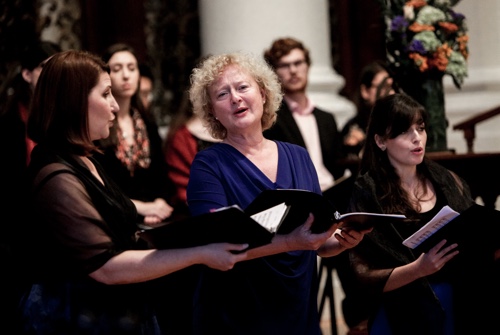
Azéma’s ideas about period performance seem to have matured — not simply gained additional scholarship and authority, but shifted from factually recreating past performances to a notion of what performing actually can be.
“When I talk about historically informed performance, I prefer to call it ‘informed performance,’” she says. “I know it was important two generations ago to acquire the appropriate instruments, and the technical tools, to make the music sound with its own weight and colors. We spent lots of energy trying to prove things right or wrong. And when Joel [Cohen, the Camerata’s artistic director for more than 40 years] introduced American music to our repertoire, we thought, ‘What’s that?’ But it changed our ability to relate to music. We were able to relate to its own vernacular. Sometimes in early music that connection is missing.”
“The wheel seems to reinvent itself every day,” Azéma continues, referring to fortune’s wheel, which figures in many Camerata programs. “Art has a way of transcending. Tyranny hasn’t invented itself in 2017, or ’16. People have struggled and won before.”
Hondré concurs, and he had this notion in mind when formulating ideas about the Boston Weekend. “These are fundamental ideas that merit regular reminders,” he says. “Especially at a time when America, and the European countries, have a tendency toward isolationism.”
“I’m a migrant, half French, so I look at those things with an admiring eye,” Azéma says about the hearty dissent and rallying cries of early American musics. “I come from a society that is much different than America. I really have always looked at this young republic with admiration. I wasn’t thinking of a French audience when I did ‘City on the Hill,’ but I did want to make sure that they would see that American discourse is not necessarily unified. Dissent is important. My strength as an artist is knowing where I come from.”
And where is she going — or at least, how long will she be going in that direction? Azéma by no means feels that her time as Camerata director is coming to an end, but she has thought about it.
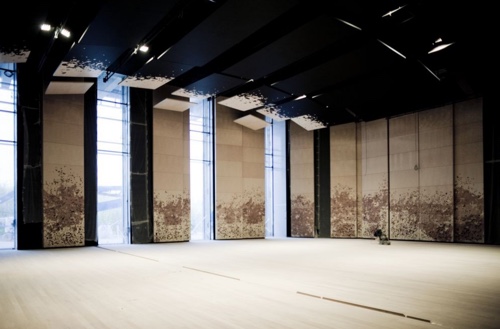
“Today could be the last day,” she says. “It’s a philosophy of life you get, when you pass certain landmarks. In the past ten years, I’ve created 16 new programs and gone back to repertoire and made it live. I’ve played with magnificent old-timers and many new faces. We’ve toured in Brazil, in the U.S., in France, all over Europe and Canada. And now for the next ten years, we need to continue exploring. That’s why we do early music, creating a context and exploring it in performance. There’s nothing like live performance.
“It’s been a long process, and I’ve been mentored by many people, as a singer and as a director. My job is to foster that notion in someone, one of the new faces who will be the next Camerata director.”
For complete information about the Paris performances Sept. 15 and 16 by the Boston Camerata and Boston Symphony Orchestra, go here.
Keith Powers covers music and the arts for GateHouse Media and WBUR’s ARTery. Follow @PowersKeith; email to [email protected]

